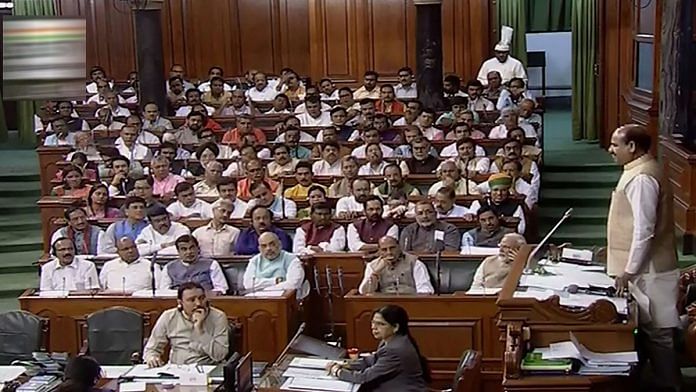New Delhi: India’s lawmakers will now get tutorials on proposed laws before they vote on them.
Lok Sabha Speaker Om Birla has decided to involve domain experts to explain the provisions of proposed legislations to Members of Parliament (MPs) before they vote on them.
The move would go a long way in enabling lawmakers to have an informed debate on proposed laws and make meaningful interventions during debates in the Lower House.
As it is, lawmakers pass laws but often without applying too much mind to them. Even if some MPs do understand the implications of a Bill and happen to have reservations against it partly or wholly, they must follow party lines at the time of voting.
Many MPs concede that, very often, law-making ends up as a mechanical process, with them voting on draft laws non-chalantly according to the party’s wish.
Also read: Yediyurappa still without a cabinet as Shah, Modi look to ‘send Karnataka CM a message’
‘Experts will brief MPs from 9 am to 10 am every day’
In the last Lok Sabha, the Congress had once asked then Silchar MP, Sushmita Dev, and another young parliamentarian to speak on a Bill piloted by then finance minister Arun Jaitley.
As the MPs had no clue about the Bill and they had to speak on the same day, they rushed to Jaitley for help.
The then finance minister explained the legislation to them, enabling them to make forceful speeches in the House later. But there are not many helpful ministers like Jaitley nor are many open-minded opposition MPs. It’s in this context that the Lok Sabha Speaker’s move assumes significance.
“Experts will brief MPs from 9 am to 10 am every day about the Bills,” Om Birla told reporters Saturday.
Discussing his move with ThePrint later, he explained that the Business Advisory Committee (BAC) of the Lok Sabha would know about the Bills that would be introduced in the House on a particular day. Accordingly, domain experts would be identified and invited to lecture the MPs about the salient features and implications of a proposed legislation.
The Speaker’s good intentions apart, the opposition’s biggest grouse against the government has been its tendency to introduce crucial and contentious legislations — such as the Bill to convert Jammu and Kashmir into two union territories and the resolution on the Presidential order on Article 370 in the Rajya Sabha — without giving any prior notice.
Rajya Sabha Chairman Venkaiah Naidu has come under frequent criticism from opposition MPs on this account.
Not a single Bill introduced in the last Budget session was referred to any parliamentary committee for scrutiny. The government chose not to constitute any parliamentary standing committees in the Budget session, ignoring vehement protests
Om Birla’s dream run
Birla, however, has reasons to be happy as he addressed his first presser following the first Budget session of this Lok Sabha.
Elected to the Lok Sabha for the second term, never did he expect a call from parliamentary affairs minister Pralhad Joshi to inform him that he would be elected the Speaker the next day as decided by Prime Minister Narendra Modi. It has been a dream run since.
Birla has been credited with conducting the most successful first Budget session since the first Lok Sabha in 1952. The Lok Sabha passed 36 Bills in this session.
On a single day, 161 MPs raised issues during the Zero Hour. Birla has now started the practice of sending all these issues to respective ministries for follow up actions.
Enthused by the positive response of MPs, he has set out to achieve paperless Lok Sabha. “80 per cent MPs have agreed to go paperless. It will save crores of rupees…The MPs will also get the Bills in time (online) to read them properly,” said the Speaker.
He sounded optimistic about a “New Sansad in New India” with modern technological and other facilities for lawmakers.
It’s not decided yet whether the same building, inaugurated in 1927, would be revamped and modernised or whether a new Parliament building would be built.
Also read: Govt might look for quick fixes to revive the economy, but that needs structural change



